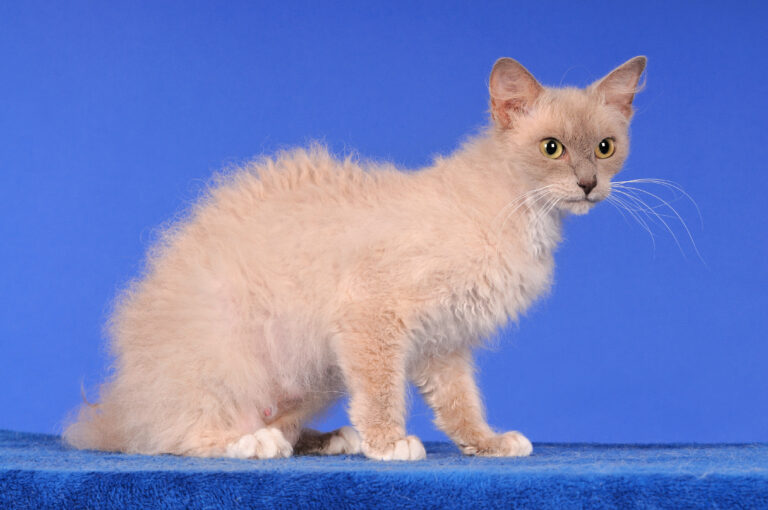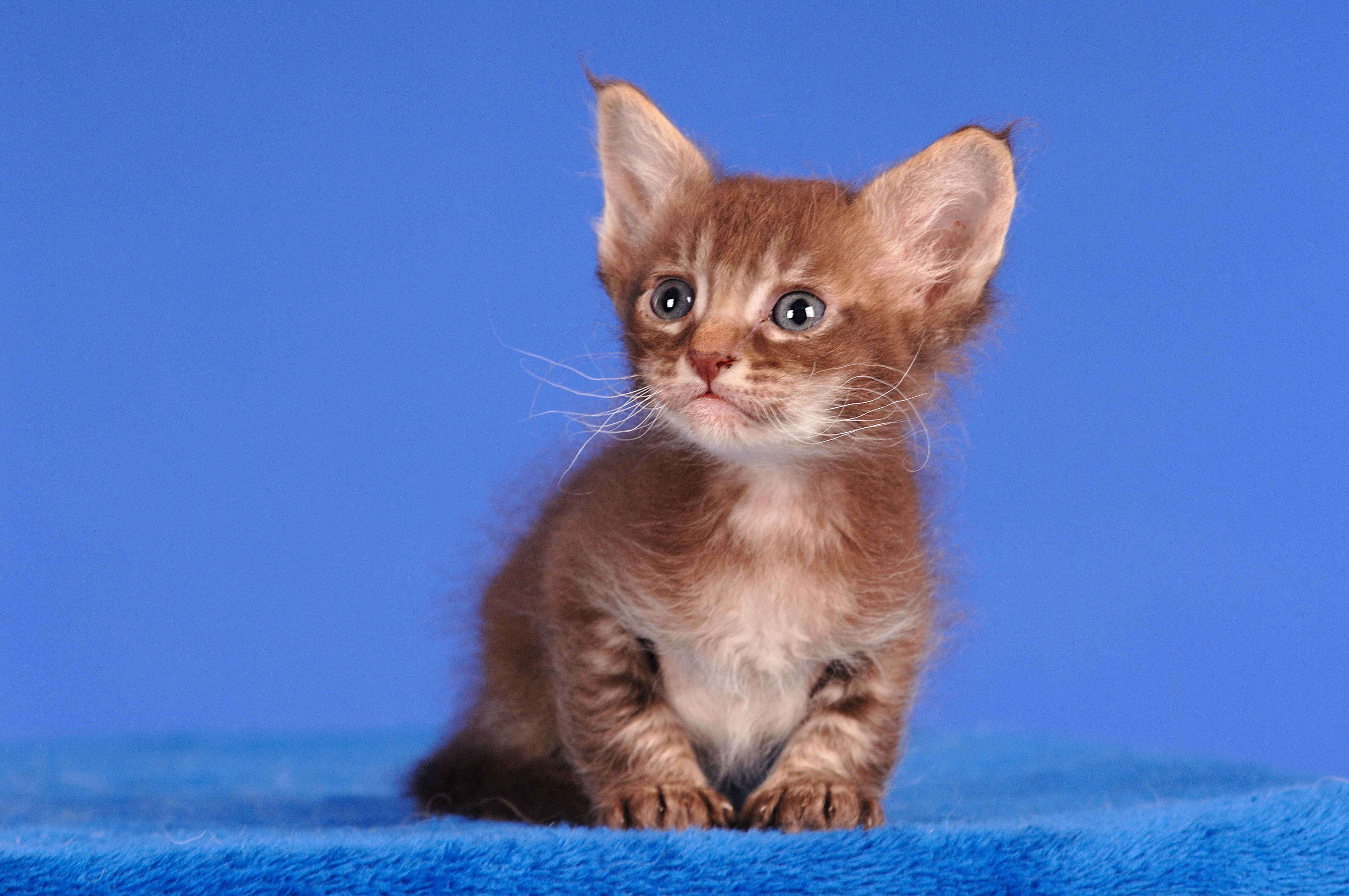Maine Coon
The Maine Coon has become one of the most popular cat breeds in the world. This is probably due to its majestic appearance, robust nature and great character.
The cat with a perm: Still a young cat breed, the LaPerm resulted from an accidental genetic mutation and is primarily characterised by its unique curly coat. Not just its soft curls, but its people-focused and affectionate character make it a perfect cat for cuddling.

© lwfoto / adobe.stock.com
LaPerm cat.
The LaPerm’s namesake and typical distinguishing feature is of course its soft curly fur. This fur stands loosely away from its body and gives it a slightly dishevelled look. The curls, which come in both long and short versions, can be very different. From slightly wavy to curly, everything is permitted (although pronounced curls are clearly preferred). Some breeders differentiate between the three hair types named by Linda Koehl:
There are no colour limits with the LaPerm. All colours and markings are permitted and the possibilities are almost endless. However, red LaPerms or LaPerms with points (Siamese markings), which particularly emphasise the curls, are especially popular. Depending on the age and time of year, the fur of LaPerm cats can also change. For instance, it can become thicker during the cold seasons and some adult LaPerms develop a collar around their neck.
The round paws and very bushy tail are typical of the medium-sized, sporty, slender and muscular LaPerm. The ears are also relatively large and can be furry like lynx ears. Their wedge-shaped head has pronounced, round whisker pads from which, matching the coat, wavy whiskers emerge. The LaPerm has expressive, slightly slanted almond-shaped eyes that can be found in all colours. Pedigree cats weigh between 2.5 and 5kg, whilst female LaPerms are usually lighter than males.
Everything began in 1982 on the farm of Linda Koehl close to The Dalles in Oregon. One of her pet cats, which lived and mated freely on her farm, gave birth to a litter with six kittens. It was already noticeable at the birth that one cat was different to its siblings, since it was entirely bald. However, this young female differed from the others in terms of her nature too. Unlike the other five kittens, which developed into independent free spirits and went their own ways on the farm, she consciously sought out the proximity of her human owner and soon followed her every move.
However, the real special feature of this little oddball was only seen at the age of around eight weeks. Unlike its mother and siblings, this originally bald cat developed very soft, curly hair. Koehl then gave her special offspring the name Curly. Like her siblings, Curly lived outdoors on her owner’s farm and mated naturally with a male. It turned out that she passed the mutated gene responsible for her curls onto her offspring. The five males from Curly’s first litter were all born bald and later developed the mother’s curly coat. Koehl, who until then hardly knew anything about genetic theory, began to read up more and more on breeding and feline genetics. She took Curly and her unusual offspring into her home and began to observe them closely and to selectively pair them with normal domestic cats.
Taken by the curly coat and gentle nature of Curly and her offspring, a friend advised Koehl to show the cats at an exhibition. Koehl was eager to hear the opinion of feline experts and was one of the first to show her curly cats to CFA breeding judge Kim Everett. Everett was keen on the new cat breed called LaPerm and encouraged Linda Koehl to continue breeding and aim for official recognition for the breed. Koehl was successful: In 2004, her breed was officially recognised by TICA (The International Cat Association). Since 2015, the breed has also been officially registered the FIFe (Fédération Internationale Féline).
Since the LaPerm is a comparatively young cat breed, the number of breeders dedicated to this breed is quite low. Most breeders are found in the US, the country of origin. There are also breeders in Britain, the Netherlands, Germany, Russia and France working to increase the population of this cat breed. Depending on the breeding association to which the breeders belong, pairing with certain oriental cat breeds can expand the gene pool. Since the curly gene in LaPerm cats is inherited dominantly – unlike with all Rex cat breeds – the typical curly fur was preserved despite cross-breeding. There are still some smooth-haired LaPerms in the gene pool. These produce offspring with normal fur as well as with curls when paired with curly-haired LaPerms.
This young cat breed isn’t just unusual in terms of its appearance; its nature differs from that of other cats in many ways too. Curly, the mother of the LaPerm breed, was incredibly trusting for a farm cat. She wasn’t in any way wild or unpredictable like her siblings, but always tried to please her owner. She fully enjoyed stroking and scratching sessions! Despite numerous cross-breedings, this new breed has been able to retain its friendly, cuddly nature and people-focused ways to this day.
In England, LaPerms are sometimes lovingly called Lappies, which reveals a lot about the favourite place of these special cats. However, this doesn’t mean that a LaPerm only lies on its owner’s lap. It enjoys playing, climbing and letting off steam just as much as long stroking sessions. Young cats in particular have a lot of energy and are sometimes very high-spirited. This often leads to very strange but funny situations. Life is perfect for them when they enjoy the full attention of their caregiver.
What LaPerms don’t like is being alone. These sociable cats really seek out contact with people, although they do choose one main caregiver in families with several members. These playful and friendly felines usually cope very well with children, as well as other pets like dogs. LaPerms also appreciate the company of fellow cats – at least when they are just as agile and temperamental as they are. A second cat cannot replace interaction with humans though.
 © lwfoto / adobe.stock.com
© lwfoto / adobe.stock.com
Anyone who wants to take a LaPerm into their home should be aware of their affectionate and people-focused nature. This breed is highly unsuitable for professionals who have to work all day. Owners of a LaPerm should be able to dedicate several hours per day to their cat: playing with it, carrying it around and of course long cuddling sessions. The pleasant purring sound when these little curl balls are lying on your lap is guaranteed to make you feel truly happy and relaxed.
Because a LaPerm is so affectionate, it will usually stay close to home even if allowed to roam freely. They can also be kept indoors, but a secured balcony with a cat net is desirable. Overall though, it is very undemanding regarding its surroundings and is satisfied even with a small city apartment. Contact with its caregiver, who it would like to have in close proximity at all times, is much more important than the living arrangements.
Grooming is also a wonderful opportunity to dedicate yourself to your cat and pay it attention – although grooming is actually not very time-consuming with the LaPerm. Like most cats, they largely groom themselves. You should simply comb excess hair out of the coat with a soft brush during the moulting period in summer. The LaPerm needs plenty of love and really enjoys being brushed! Like with all pet cats, you should also regularly check the ears, eyes and teeth. Problems can therefore be identified and treated at an early stage.
Regular care makes a significant contribution to your LaPerm’s health. This of course also includes annual check-ups at the vet as well as adhering to important vaccination appointments. Although this young cat breed is very robust and there are no known breed-specific diseases, like all pet cats, a LaPerm can suffer from regular diseases, such as a bacterial gastrointestinal infection or upper respiratory diseases. Hence, it should be vaccinated against cat colds and panleukopenia. If the LaPerm has free outdoor access, it should also be vaccinated against rabies and Feline leukemia virus.
Thanks to its robust health, the LaPerm doesn’t have any special dietary requirements. However, it should receive a high-quality cat food so that it gets all the vital nutrients it needs for a long and healthy feline life. You should pay more attention to the ingredients than the price. A high-quality food is made up of a high proportion of meat, supplemented by different types of fruit and vegetables. There should be as little grain as possible. Sugar, chemical preservatives and artificial flavour enhancers should be avoided entirely.
What is known as BARF is becoming more and more popular amongst dog and cat owners. However, this method of biological raw feeding requires some knowledge regarding the nutritional requirements of cats, as well as the nutrient content of different foods. If you don’t have such knowledge and don’t like nutrient charts, you should choose canned food instead. For example, many cat owners feed their cats a mix of wet and dry food to make the most of the advantages of both food types. Decide for yourself which feeding method you feel most comfortable with and which food your LaPerm likes the most – that’s the healthiest option!
Discover our selection of cat food!
Another question: Do you like dogs? The LaPerm can be compared to dogs. Just like man’s best friend, it follows its owner everywhere they go. It will try everything to get its family’s attention and affection. This breed is not a free spirit, unlike many of its fellow felines that retain their independence and enjoy spending several hours roaming in the outdoors. The LaPerm always looks to be close to its family. Even a second cat – which will undoubtedly enrich the life of this sociable cat breed and provide welcome company – cannot replace contact and closeness to its human family.
The most important question you should ask yourself before buying a LaPerm is: Can I spend enough time every day playing with, caring for and cuddling my cat? If you’re on the go a lot, be it for work or leisure, and have to leave your cat at home alone a lot, any reputable breeder would advise you against buying a cat from this affectionate pedigree breed. However, if you or your family do have sufficient time and inclination to fully dedicate yourselves to a cat, you will find an incredibly loving and charming companion in the LaPerm. Not just its perm make it special to look at, but its charming and funny character are something quite special.
| Feature | Description |
| Origin | United States |
| Size | Medium |
| Coat | Short or longhaired, with loose curls |
| Color | All colors and patterns |
| Temperament | Playful, Affectionate, Intelligent |
| UK Price | Cost between £500 and £1,500 |
| Weight | 2,5 – 5 kg |
| Lifespan | 13-20 years |
Here are some purchase proposals curated by the zooplus editorial team
The products featured have been carefully selected by our editorial staff and are available at the zooplus online pet shop. The selection does not constitute advertising for the mentioned brands.
The Maine Coon has become one of the most popular cat breeds in the world. This is probably due to its majestic appearance, robust nature and great character.
Large eyes and attentively upright ears instantly tell you a great deal about this charming breed of cat: Abyssinians are inquisitive and affectionate towards people.
With its long, dense fur, rounded ears, and intense stare, the Pallas Cat, or Manul, looks rather fluffy, yet somewhat dangerous. However, don't be fooled by its appearance—this is no petting zoo resident. The Manul is a wild animal and considered untameable.